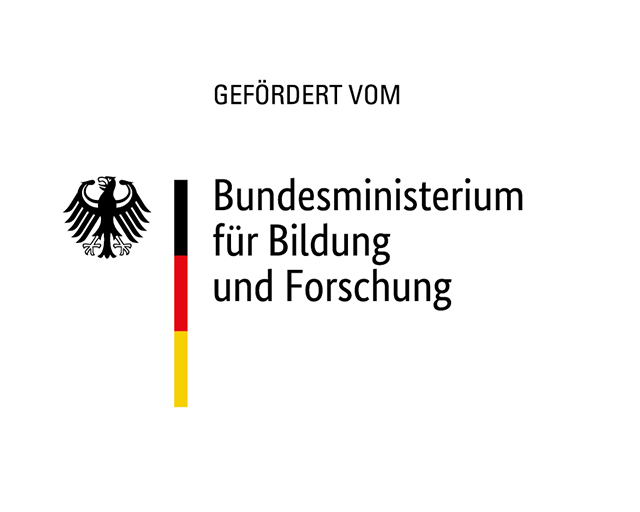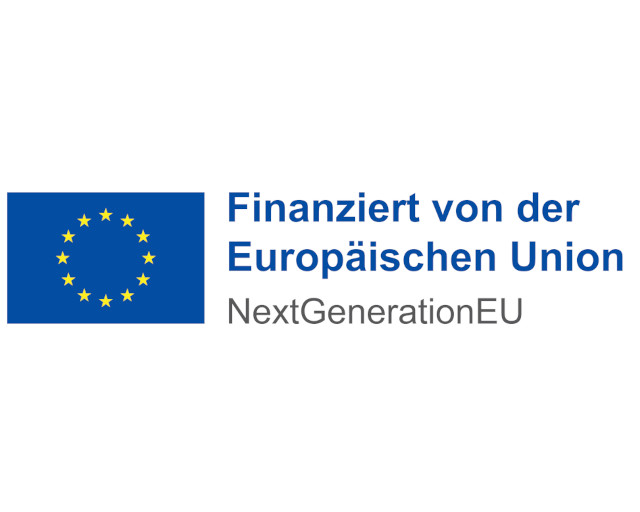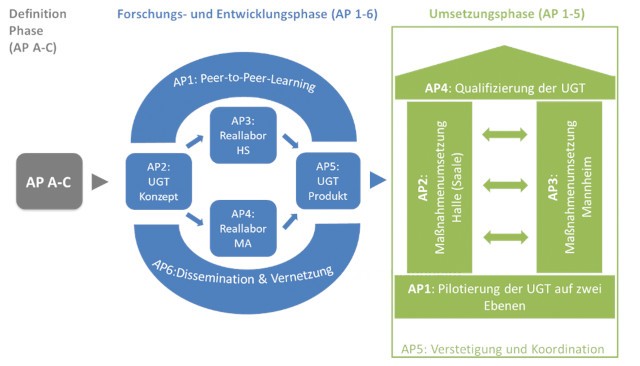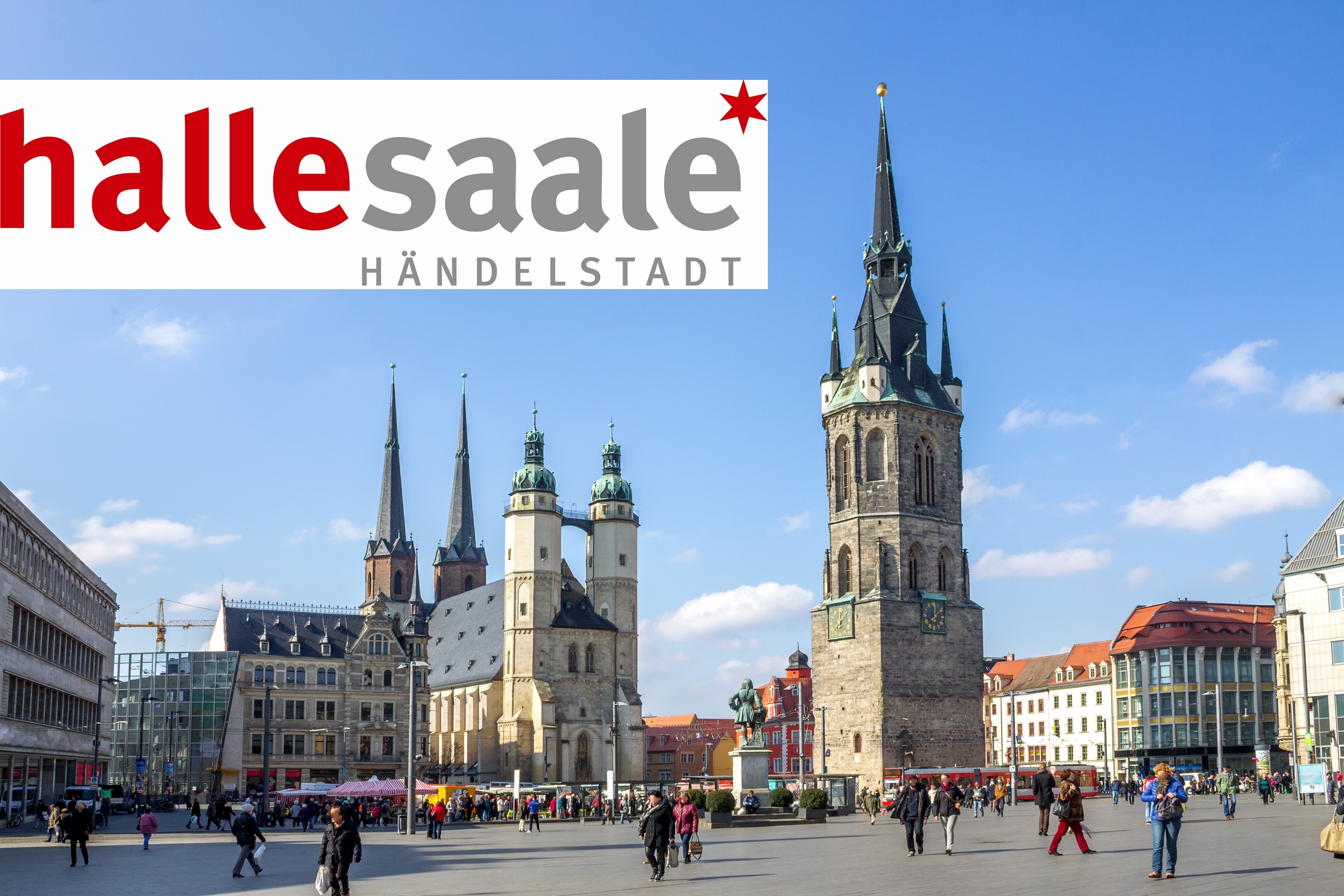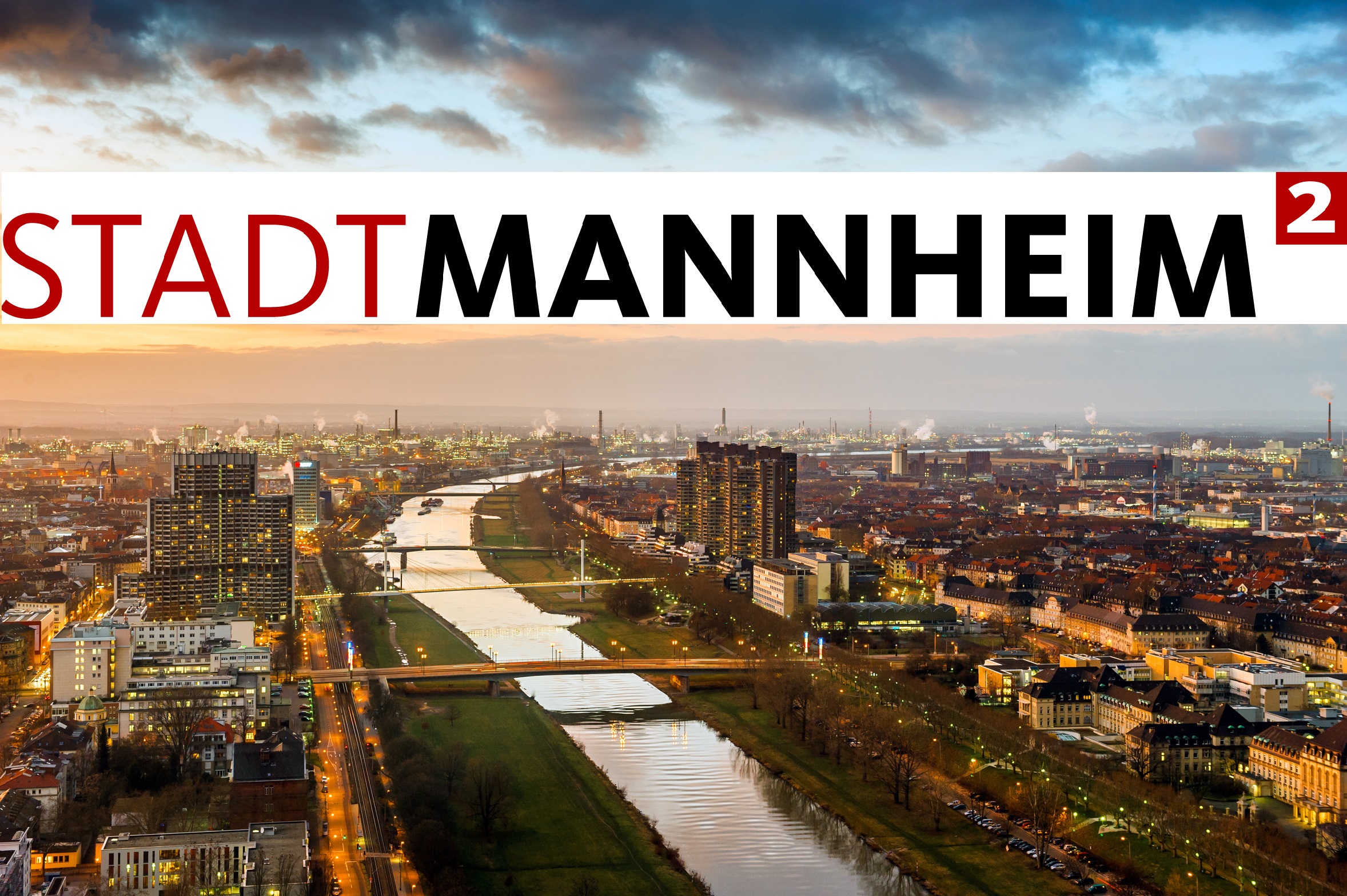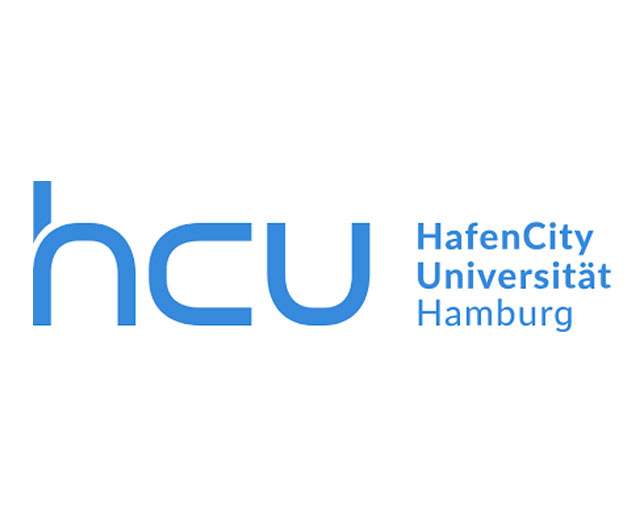
SMARTilienceGoesLive
The SMARTilience project enters the implementation phase. After two previous project phases and four years of intensive collaboration, the kick-off for the third phase SMARTilienceGoesLive has now taken place. Representatives from the Living lab in the cities of Mannheim and Halle (Saale), the HafenCity University of Hamburg and, of course, the University of Stuttgart IAT are taking part.
Heat islands, flood situations, increasing heavy rainfall events - these are not isolated phenomena, but scenarios for which German cities must be prepared. Early analyses of concrete needs from the perspective of administrations and citizens as well as the detailed preparation of implementation processes for climate protection and adaptation measures are crucial for the successful implementation of climate-resilient urban development.
In the two previous project phases work and strategies have already been developed. In SMARTilienceGoesLive, these findings are in turn used to implement projects and test them in real practical application for their manageability, optimization needs and necessary supplementary content.
These projects include, for example, the technical and structural implementation of measures in Halle (Saale) and Mannheim
- The geodata use strategy is to be expanded; this focuses in particular on the area of flood prevention.
- Sensor technology is also used for a greater extent.
- Drinking fountains will be installed to counter the heat problem,
- Planting and shading elements will be installed, and
- an intelligent irrigation system.
- At the same time, interdepartmental cooperation is to be strengthened, the city administration is to be more closely involved and sensitized, and the citizens are to be consulted on issues.
- citizens are also to be consulted on issues. In this context, a co-creative interactive stakeholder platform with a cooperative approach is to be implemented in Halle (Saale) to enable low-threshold participation.
- This will be made available to all via the Urban Governance Toolbox.
- In Mannheim, the developed heat action plan will be implemented and an own climate monitoring will be created
Both cities will be analyzed and evaluated in their processes by the accompanying research during the implementation of measures. All findings from the third project phase will be incorporated into the Urban Governance Toolbox and passed on.
Through the holistic concept, which includes both the structural and technical measures, but also the administrative staff and citizens, all elements of a successfully acting urban governance will be connected.
It promises to be an exciting project phase with many implemented measures. We look forward to further cooperation and will keep you informed! If you have any questions, please feel free to contact us at any time via the contact form or the specified contacts
Tabbed contents
The Project
What is at issue?
While municipal climate protection has become an integral part of strategic development in many German municipalities, adaptation to climate change is even less prominent on the municipal political agenda. The scientific community agrees that numerous negative impacts of climate change cannot be prevented at the local level in the medium to long term, and that local adaptation strategies are becoming increasingly important. However, there is still a lack of adequate control approaches that enable municipalities to strategically address climate resilience as part of a variety of different goals and to translate it into intergovernmental action plans.
Despite this, there are already a large number of concepts and tools available, such as those from the Fraunhofer innovation network »Morgenstadt«, that enable more efficient control of complex urban development processes. However, these concepts have yet to be applied to the context of climate resilience in cities.
What does SMARTilience offer?
SMARTilienceGoesLive is a project that aims to help German cities prepare for scenarios such as heat islands, floods, and increasing heavy rainfall events. The project focuses on early analysis of concrete needs from the perspective of municipalities and citizens, as well as detailed preparation, to ensure the successful implementation of climate-resilient urban development.
The project offers a range of services and events to help municipalities increase their climate resilience. These include an Urban Governance Toolbox, which provides insights and forms of governance that can be adapted to the needs of each municipality. The project also includes the participation of stakeholders from urban society and other municipalities, to ensure a diverse exchange of experience and knowledge and to generate local knowledge that can be incorporated into the design and implementation of measures.
How is SMARTilience structured?
After the definition phase and the research and development phase up to spring 2022, SMARTilienceGoesLive now comes to the implementation of previously gained knowledge. This phase is divided into different work packages that run simultaneously.
The Urban Governance Toolbox developed in the previous project phase will also be continuously expanded in the implementation phase. The contents of the toolbox are to be applied in the concrete implementation of measures in the partner cities and are to be checked and expanded for optimization needs.
The work packages in the implementation cities deal with the implementation of technological and structural measures on the topic of heat and heavy rain. In Halle (Saale), the focus is on setting up a solar register and further networking with urban stakeholders; in Mannheim, the heat action plan is to be implemented in concrete terms and expanded to include structural measures.
A critical success factor in SMARTilienceGoesLive is the intensive exchange of knowledge between all project partners and especially between the participating cities and with external experts. Therefore, peer-to-peer learning and the publication of research results continue to play a central role.
SMARTilienceGoesLive is funded by the BMBF as part of the funding measure »Implementation of the Flagship Initiative Future City«. The implementation phase started in February 2022 and will run until the beginning of 2024.
Our Real-World Laboratories
Reallabor Halle (Saale)
Halle (Saale) is the most populous city in Saxony-Anhalt and is one of the most densely populated areas in Central Germany. A diverse art and cultural scene as well as a science and research location with the National Academy of Sciences Leopoldina, the vineyard campus and the seat of several universities characterize the city. After 20 years of urban shrinkage, a turnaround in urban development towards a growing city has now taken place.
Challenges
Extreme weather events, floods, heavy precipitation, heat waves in the old town core, storms and invasive plant and animal species.
Measures planned in the project
The Reallabor Halle (Saale) investigates the resilience respectively vulnerability of the urban area using geo-information. Its aim is to determine what changes the area under investigation will face in terms of expected climate change, what sensitivities it shows to the expected changes and how high the potential is for meeting the emerging challenges.
For this purpose the Reallabor Halle (Saale) analyzes the existing spatial data across departments, identifies optimization potentials for topic-specific data stocks (data gaps) and user-oriented data utilization strategies are developed. Local vulnerabilities, needs and adaptation potentials are going to be supported, systematized and visualized using data technology.
The result is an individual spatial data use strategy for the city of Saale. In addition to specific urban areas with climate relevance (fresh and cold air channels, heat islands), risk and hazard areas will be also determined in order to be able to derive further targeted adaptation and prevention measures.
The use of municipal spatial data in particular for integrated action is currently still well below the possibilities:
Data is not be analyzed across departments and therefore flows comparatively little into higher-level management decisions. Possible synergy and savings effects of different municipal areas of action remain invisible and may not be collected.
At present, municipal spatial data is mainly be provided on a supply-oriented basis and only to a limited extent on a use-oriented basis. The use of spatial data for the analysis of synergies, for the prioritization and operationalization of measures and for targeted communication with various actors is still in its infancy. For an intelligent, smart and more extensive use of data, useful information is to gain from the available data. This is made possible by combining (spatial) data, context and interpretation and is being driven forward in the Reallabor Halle (Saale).
- Inventory of the spatial data infrastructure and municipal spatial data use in Halle (Saale)
- Identification of optimization potentials (data gaps, strengths and weaknesses of data usage)
- Development of a data use strategy for the geo-information portal Halle (Saale), by which relevant impacts, needs and adaptation requirements for climate impact adaptation can be visualized
- Communication and processing of the necessity for climate impact adaptation for the urban society
- Updating and implementation of the integrated climate protection concept and interlocking with existing plans in the city
- Checking transferability to other municipalities / learning from each other (peer-to-peer)
- interdisciplinary exchange and networking activities
Contact
Sabine Falk, M.Sc.
Dienstleistungszentrum Klimaschutz
sabine.falk@halle.de
Daniel Zwick
Dienstleistungszentrum Klimaschutz
daniel.zwick@halle.de
Links & Further information
www.Klimaschutz.halle.de [in german]
Model City Mannheim
Mannheim is the third largest city of Baden-Wuerttemberg and the center of economic, ecological, cultural and social processes in the Rhine-Neckar Metropolitan Region on an area of 145 km². Furthermore, Mannheim distinguishes itself as a location of trade and industry, as a university city and as an important transport nodal point. As Germany´s most compact metropolis, Mannheim continues to grow as a diverse, tolerant and liveable city, shaped by its 320.080 citizens (31.12.2018).
Challenges
increased temperature, increased air pollutants, lack of cold air supply, extreme storm weather conditions, humidity as well as heavy rainfall events, flooding, water scarcity, invasive plant and animal species
Measures planned in the project
Analysis of the available (geo-) data and development of a strategy for the use of data for climate protection and adaption
Consideration of climate protection and climate change adaption in current projects of urban development or planning and approval procedures as well as cross departmental work
Implementation of the »Urban Governance Toolbox« to analyze the concrete need for action and to select suitable planning and implementation measures taking into consideration the specific problem in Mannheim
development of heat action plan
Increased communication and citizen participation in climate change mitigation and adaption to show specific needs, identify consternation and profit from available synergies
Action plan 2030 for climate protection and climate change adaption to support integrated sustainable urban development
Peer-to-Peer: systematic promotion of exchange and learning between project partners (mentoring, studying, shadowing)
Contact
Georg Pins
Abteilung Klimaschutz Stadt Mannheim
Georg.Pins@Mannheim.de
Alexandra Idler
Abteilung Klimaschutz Stadt Mannheim
Alexandra.Idler@Mannheim.de
Links & Further information
MANNHEIM AUF KLIMAKURS [in german]
Konzept „Anpassung an den Klimawandel in Mannheim“ [in german]
Leitbild „Mannheim 2030“ [in german]
Homepage Stadt Mannheim [in german]
Our Partners
HafenCity University Hamburg, Department Urban Planning and Regional Development
The department of urban planning and regional development (department director: Prof. Dr.-Ing. Jörg Knieling) has extensive experience in implementation, coordination and processing of application-oriented research projects with focus on climate protection and climate adaptation. The focus of the numerous German, as well as EU research projects lies in analysing climate-relevant governance and planning issues of cities and regions, as well as their implementation in planning practice.
Role in the project
The department of urban planning and regional development (department director: Prof. Dr.-Ing. Jörg Knieling) has extensive experience in implementation, coordination and processing of application-oriented research projects with focus on climate protection and climate adaptation. The focus of the numerous German, as well as EU research projects lies in analysing climate-relevant governance and planning issues of cities and regions, as well as their implementation in planning practice.
Contact
Prof. Dr. Jörg Knieling
joerg.knieling@hcu-hamburg.de
Nancy Kretschmann
nancy.kretschmann@hcu-hamburg.de
Olga Izdebska
olga.izdebska@hcu-hamburg.de
Links & Further information
HafenCity Universität Hamburg (HCU): Jörg Knieling (hcu-hamburg.de) [in german]
Universität Stuttgart – Institute of Human Factors and Technology Management (IAT)
The Institute of Human Factors and Technology Management (IAT) at the University of Stuttgart cooperates closely with the Fraunhofer Institute for Industrial Engineering IAO and combines applied research with practice by providing an in-depth understanding of organizational forms and technology. In the field of mobility and urban system design, the Institute concentrates its competence in order to make the city of tomorrow sustainable, livable, resilient and safe with the participation of all relevant actors.
The IAT contributes intensive experience in the coordination of national and international research projects as well as methodological know-how and governance expertise in urban development projects to SMARTilience.
Role in the project
The IAT is leading the consortium and manages the overall project. It serves as the internal and external contact for SMARTilience. The IAT will accompany the project from a scientific perspective and contribute years of expertise in innovative urban system design and in the governance and implementation of urban development projects.
Contact
Rebecca Nell
Urban Data & Resilience
Rebecca.nell@iao.fraunhofer.de
Links & Further information
Resources and Publications
Download information
For more information on SMARTilience, please see our project brochure:
Smartilience brochure [only available in german]
Results of the Syntegration:
Link to the preliminary opinion survey on the main challenges, weaknesses, and strengths related to governance of climate change mitigation and adaptation in cities:
Link to Analysis of the Opinion Survey (PDF Malik Smartilience Opinion Survey)
Participation
You would like to participate in the project?
SMARTilienceGoesLive sees itself as a transdisciplinary project that aims to create new knowledge not only for science, but also for concrete application in cities. This requires an intensive exchange of knowledge between actors. A central concern is therefore also the exchange with other cities beyond the project boundaries. In order to systematically promote this exchange, to recognize and analyze common challenges, to identify working approaches to solutions and to learn from each other, SMARTilienceGoesLive pursues the approach of so-called peer-to-peer learning.
Peer-2-Peer Learning
Peer-2-Peer means an equal exchange between actors who share experiences and knowledge with the aim to learn from each other. In order to set a successful learning process in motion, a regular, preferably systematized exchange is particularly important here. In order to create concrete added value, SMARTilienceGoesLive therefore ensures that such an exchange can take place repeatedly and in an organized setting. So far, cities that are in the process of integrating climate impact adaptation into their climate protection concepts have participated, as well as municipalities that have already developed concrete solutions.
So far in the project
The previous project phase of SMARTilience was characterized by a high number of different networking workshops and exchange events: In the project cities of Halle (Saale) and Mannheim alone, there were numerous information events and workshops in which the topic of climate adaptation was worked out together with urban stakeholders or concrete measures were already developed.
In addition, regular peer-2-peer workshops with various German municipalities took place within the framework of the project, in which the focus was on city-to-city exchange and input on various topics from the scientific community. Here, all participants were able to benefit from each other's knowledge and gain new insights into the topics.
Over the past two years, SMARTilience has included P2P workshops focusing on the following topics:
- Dealing with heavy rain
- Climate neutrality
- Heat and vulnerable groups
- Reallabor - opportunities and risks
- Geodata use
- Climate impact adaptation in municipalities
Participation
SMARTilienceGoesLive is always looking for more cities and interested parties to participate in our P2P workshops. Are you currently working on climate impact adaptation in your community as well? Are you a researcher interested in current developments in Germany? Whether you have already developed concrete measures or want to learn from other cities - your participation will enrich all stakeholders. Join us - we look forward to hearing from you!
Review Smartilience 2
Results of the SMARTilience project in the research and development phase
In the Second Phase of SMARTilience, important preliminary scientific work has already been done for the SMARTilienceGoesLive process.
Urban Governane Toolbox
The Urban Governance Toolbox (UGT) developed in the project has so far collected 160 governance practices for implementing climate resilient urban development. In addition to the scientific partners from the Universities of Hamburg and Stuttgart, the two city partners were also significantly involved in the creation of this UGT; furthermore, the perspectives of other stakeholders were incorporated in various digital participation formats.
Exchange in the project
A central concern of SMARTilience was and is also the exchange with other cities and municipalities. This involved cities that are in the process of integrating climate impact adaptation into their climate protection concepts, as well as municipalities that have already developed concrete solutions. Numerous formats were used for exchanges between science, industry and municipalities. In addition, further exchange and learning processes were initiated between municipalities outside the project consortium and between municipal administration and civil society. Content was collected based on the concrete needs of the cities and supplemented with practical and scientific input.
Living lab Halle (Saale) and Mannheim
In the living labs Halle (Saale) and Mannheim, various measures were developed that will now be put into practice in the implementation phase. In Halle (Saale), for example, numerous networking activities took place in order to promote the exchange between actors in the fields of climate protection and climate adaptation. The goal was to develop a strategy for the use of geodata, which included the creation of a heat vulnerability map to identify specific needs in the area of heat. Several recommendations for action for the implementation phase also emerged from the events, as well as a Climate Alliance (Halle) Saale. The focus in the Mannheim living lab was on the creation of the Mannheim Heat Action Plan, which is intended to contribute to heat protection and heat prevention, and above all to protect heat-vulnerable, helpless population groups. Various stakeholders from the city administration, the municipal council, the population and the social, nursing and medical sectors were integrated in this process. For a smooth implementation, a geodata utilization strategy was also developed for this purpose.
